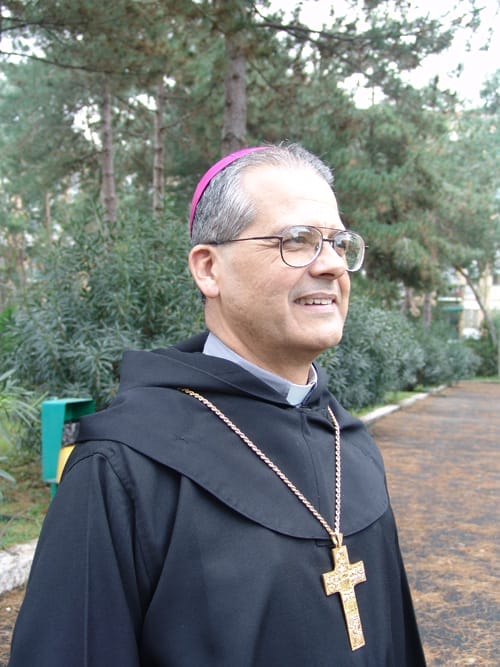Upon arriving in Rome as delegate to the Synod of Bishops, Msgr. Mario Molina, Archbishop of Los Altos in Guatemala, was taken aback by the sad news that had just happened in his diocese. There was an angry protest of rural folks that had led to a confrontation with security officers, and consequently, to the death of eight persons.
When we approached him, he had no complete and ascertained information yet, but he has not failed to express his concern for his faithful as their pastor. Likewise, he addressed them with his words of consolation and encouragement.
Question.– Monsignor, according to the news, what has happened in Totonicapán?
A.– According to my information from the press on the internet and from what I have been able to know through my friends, what happened in Totonicapán was the outcome of complains and retorts that existed for two weeks. In fact, there were demonstrations in Cuatro Caminos and in a village called Alaska, while another group of residents of Totonicapán was in the Capital to meet with the President of the Republic. Therefore, as I understand it, it dealt with a demonstration of force in terms of number in support of their representatives’ mission. There were means of coercion to oblige many to participate, which otherwise they would have not done. According to my information, the government sent security forces to these two areas so that the passage on the major road would not be blocked for a long period of time. The military was present as reinforcement of the National Police. After five hours, the demonstration was dispersed after an interchange of stone and tear gas between the two sides. But things got complicated in the village of Alaska. It seems that there was a security officer of a commercial transport, who fired into the crowd at the time when he felt assaulted by them. This shot caused the first death that stirred up the crowd. Then, came successive shots, which ought to be clarified as yet. According to the evidence being established, these shots came from the firearms of the Armed Forces of Guatemala. No one knows who gave the order to fire. According to some recounts, the vehicles of the Armed Forces had received an order to withdraw.
Q.– ¿How do you feel about the incident, as you are so many miles away from Guatemala?
A.– These things happened when I was leaving for Rome to participate, as a delegate of the Episcopal Conference of Guatemala, in the XIII Synodal Assembly. I came to know about it for the first time on Saturday, when I read the news from Guatemala on the Internet. Then, I started to receive some additional information through the communiqué of the Episcopal Conference and some news from the Vicar General. Distance makes me helpless and it does not allow me to accompany the aggrieved families in their pain and powerlessness which the people feel as well when they see themselves implicated in actions of political scope, which go beyond their quotidian concerns. I know that that priests of Totonicapán, both of the municipality and of the state, have endeavored to be with their parishioners and to accompany them in their sorrow and I am grateful to them for this attitude.
Q. What can you say to your people in this time of pain and chaos?
A. Firstly, it is necessary to say that one ought to take into consideration the dignity of the person, of the whole person. If it is true that there was coercion to participate in the demonstrations, one cannot make instruments out of persons, endangering their physical integrity such as these. Even though, it is still necessary to clarify how these deaths came about and who is the person responsible for it, one cannot try to solve the conflicts by killing the adversary, as if the human life of the victims were the discountable price of victory of force. We desire for peace and we pray for peace and mutual respect. The claims and petitions as basis and cause of demonstrations must be measured according to their just parameters. I believe that some of the complains, most especially that of electricity charges, have as reference the local authorities and not the central government. In a democracy, negotiation is the only way, with that awareness that negotiation does not always have as a result the attainment of objectives in a time, place and manner that one wants.


